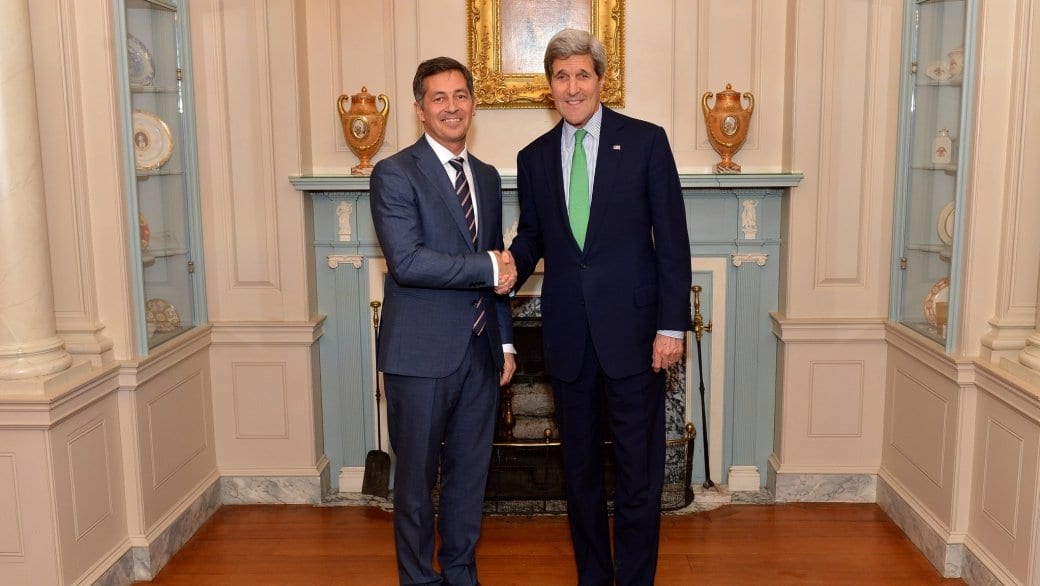The federal government says it’s still crafting its foreign affairs approach to LGBT issues abroad, and has yet to decide whether to heed the NDP’s call to create a specific envoy position.
In a private letter sent Dec 11, 2015, and provided to Daily Xtra, the New Democrats urged the Liberal government to follow the United States in creating a special diplomatic post to advocate for persecuted LGBT people worldwide.
Two months later, a spokesperson for Foreign Affairs Minister Stéphane Dion tells Daily Xtra the idea is among the initiatives the government is studying.
“We’re looking into every possible option to ensure that we’re promoting and protecting the LGBTQI community, at home and abroad,” says Joseph Pickerill, a senior official in Dion’s office.
“Both Prime Minister Trudeau and Minister Dion have demonstrated their personal commitment to raising this issue on the world stage and have encouraged every single ambassador and every member of staff to do the same,” he says. “That is how we will be better placed to tackle this issue everywhere and at every level.”
While Western countries have seen recent momentum toward marriage and adoption rights for same-sex couples, other countries like Russia and Nigeria have enacted discriminatory policies and experience high rates of homophobic violence.
The International Lesbian, Gay, Bisexual, Trans and Intersex Association lists 76 countries as having laws that criminalize same-sex behaviour, according to its 2015 edition of the annual State-Sponsored Homophobia report. That’s down from 92 countries a decade prior.
The former Conservative government funded a series of initiatives to counter LGBT persecution. Before resigning in February 2015, former foreign affairs minister John Baird loudly criticized countries that criminalized homosexuality, famously clashing with Ugandan parliamentary speaker Rebecca Kadaga at a global conference in October 2012.
The Foreign Affairs department says that LGBT rights are part of its annual three-week training program for about 90 human-rights advocates from abroad, about 10 percent of whom focus mainly on LGBT issues.
Through the department’s small-grants fund, 27 projects “totalling approximately $560,000 have been undertaken or are underway in Asia, Africa, the Middle East and the Americas that have identified LGBT rights as the objective of the project,” according to department spokesperson Amy Mills.
This past year, the fund identified “protecting human rights and fundamental freedoms, [including] vulnerable groups such as sexual minorities” as a key priority.
The new Liberal government has indicated it intends to stick with LGBT issues as a foreign-policy objective. But the NDP, aiming to position itself as “the progressive opposition,” wants the government to create a specific envoy position.
The party’s December letter said the former Conservative government “has not done enough” for LGBT people at home and abroad, and asked Dion to “return to Canada’s traditional role as an international defender of diversity and equal rights.”
The letter said such an envoy would “send a strong message to our international partners.”
In April 2015, US President Barack Obama appointed veteran diplomat Randy Berry to the new post of Special Envoy for the Human Rights of LGBTI Persons.
US government sources have said the title was intentionally crafted to focus on human rights, and not imposing a “gay agenda.” Berry has spent his term meeting with foreign officials and local activists, while keeping in touch with other US diplomats.
In December 2015, Nigerian LGBT activists told The New York Times that overt Western backing for their groups had played into the hands of social conservatives, who claimed homosexuality was a foreign import.
In Britain, the Labour party pledged to also create an LGBT envoy in March 2014 if elected in the following year’s vote, though the party ended up taking second place.
As for the Trudeau government, a coalition of Canadian groups has issued 22 recommendations concerning LGBT people abroad.
That report from the Dignity Initiative asks the government to take in more LGBT refugees, advocate for imprisoned queer people and curtail aid given to non-governmental organizations that promote persecution against sexual and gender minorities. The report, authored by 30 people and organizations, was endorsed to by more than 124 civil society groups.
At a debate hosted by the group on Sept 24, 2015, then-Liberal candidate Bill Morneau, who has since been elected and named finance minister, said Canada would bolster its action on human rights abroad, including LGBT issues.
“The next Liberal government will closely consider all of the recommendations presented by the Dignity Initiative as we move forward in advancing the cause of LGBTQ rights,” he said.
Editor’s note: An earlier version of this story incorrectly stated that a Dignity Initiative report recommended curtailing aid to anti-gay governments, when it actually advocated curtailing aid to anti-gay NGOs.

 Why you can trust Xtra
Why you can trust Xtra


